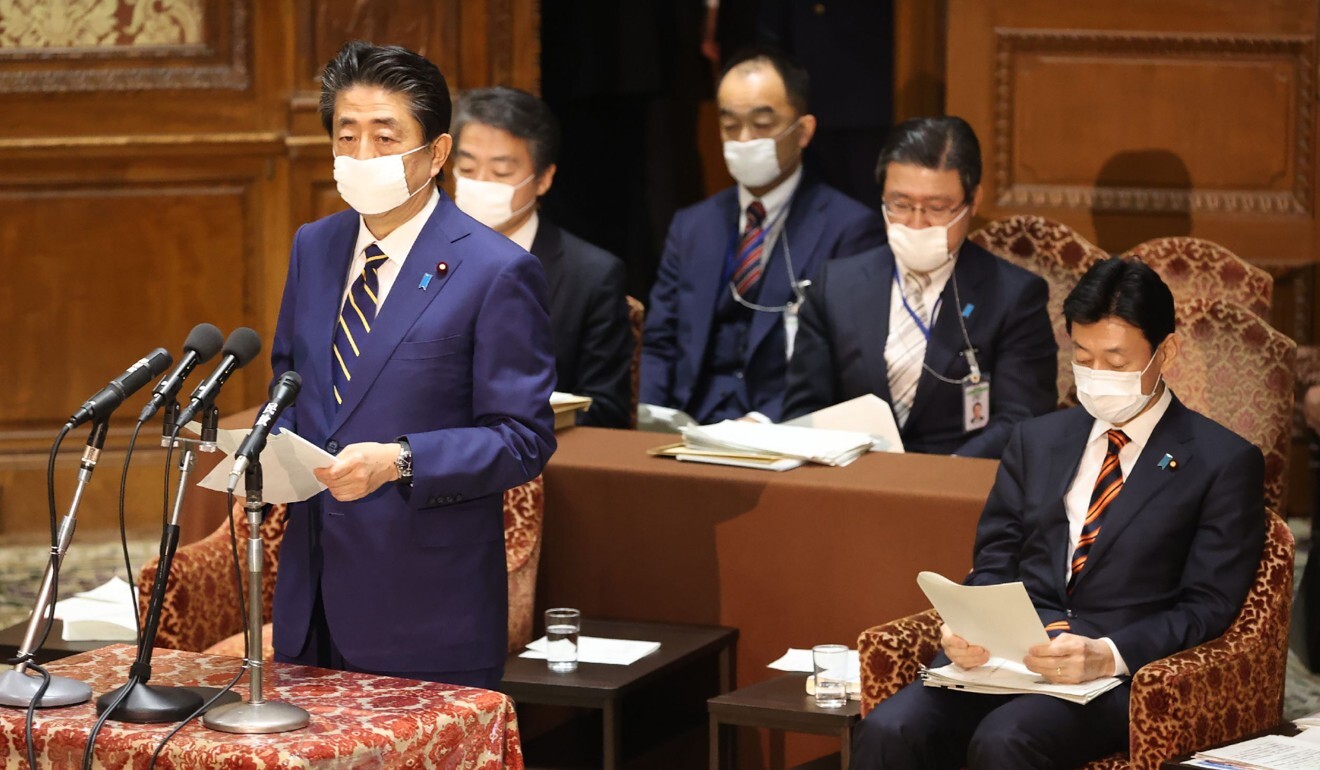
Coronavirus: Japan declares state of emergency, 18 Tokyo doctors infected after dinner party
- Local governors in Tokyo and six other parts of the country can now enforce stricter measures as Covid-19 infections rise
- The trainee doctors at Keio University Hospital defied requests not to socialise in groups, with 99 of them now in self-isolation
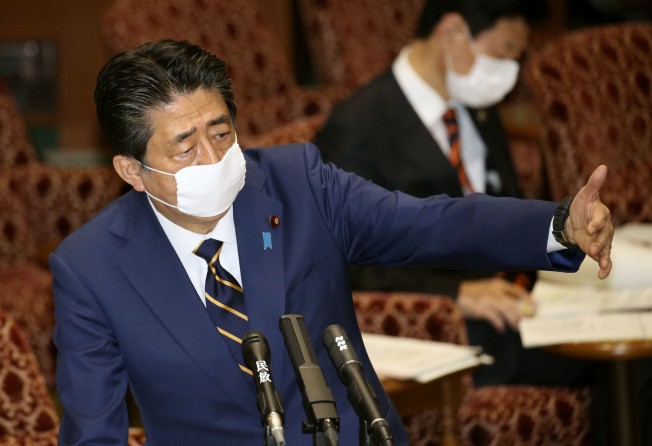
Japanese Prime Minister Shinzo Abe on Tuesday declared a state of emergency to fight new coronavirus infections in major population centres and unveiled a stimulus package he described as among the world’s biggest to soften the economic blow.
The state of emergency, giving authorities more power to press people to stay at home and businesses to close, will last through May 6 and be imposed in the capital, Tokyo, and six other prefectures – Osaka, Kanagawa, Saitama, Chiba, Hyogo and Fukuoka – accounting for about 44 per cent of Japan’s population.
“The most important thing now is for each citizen to change our actions,” Abe said in televised comments made at a meeting of a government coronavirus task force. “If each of us can reduce contact with other people by at least 70 per cent, and ideally by 80 per cent, we should be able to see a peak in the number of infections in two weeks,” he said.

“We have decided to declare a state of emergency because we’ve judged that a fast spread of the coronavirus nationwide would have an enormous impact on lives and the economy,” Abe said.
“It is no exaggeration to say that Japan’s economy, and the world economy, is facing the biggest crisis since postwar right now. We will protect the employment and life at all costs,” Abe told a news conference.
The government also approved a stimulus package worth 108.2 trillion yen (US$993 billion) – equal to 20 per cent of Japan’s economic output – to cushion the impact of the epidemic on the world’s third-largest economy.
That exceeds the 11 per cent of US output for the stimulus package laid out by President Donald Trump and 5 per cent of output for Germany’s package.
Abe said direct fiscal spending would amount to 39 trillion yen, or 7 per cent of the economy, more than double the amount Japan spent following the 2008 collapse of Lehman Brothers.
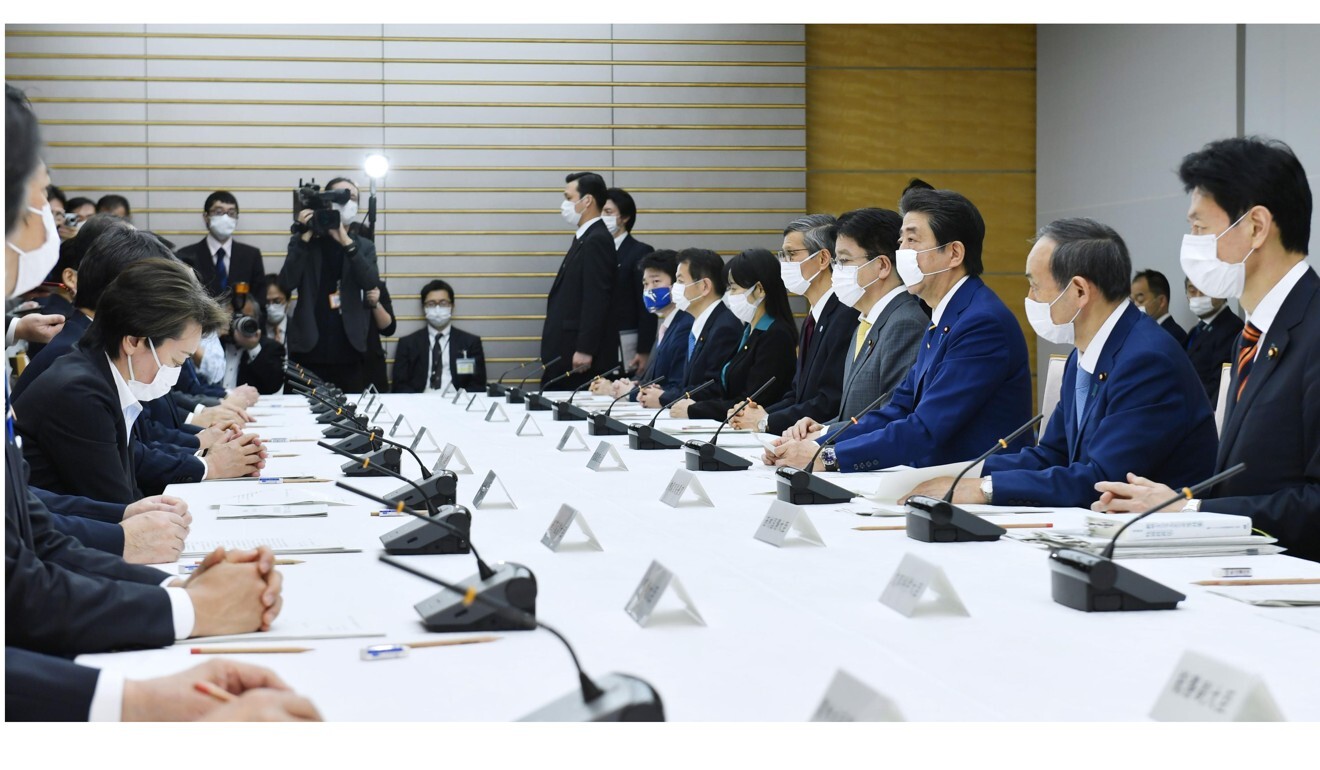
Japan will sell a record amount of extra bonds this financial year, worth more than US$165 billion, straining the industrial world’s heaviest debt burden, to comply with the stimulus package.
Finance Minister Taro Aso told reporters that the government was placing higher priority on trying to revive the economy than restoring public finances.
The package included 20 trillion yen of stimulus steps already put in place last December, which helped inflate the headline figure. Actual fiscal spending came to 39.5 trillion yen, including 10 trillion yen from December’s stimulus.
In a rare move, the government on Tuesday compiled an extra budget worth 16.8057 trillion yen at the start of the new financial year in April to fund the stimulus, highlighting the urgency.
The stimulus package includes cash payouts worth 300,000 yen per household facing income declines, corporate financing support totalling 45 trillion yen to help firms continue business operations, and a scheme for private financial institutions to lend to struggling small and midsize firms at zero interest.
Once the state of emergency is in place, governors have the authority to urge people to stay at home or request facilities used by large numbers of people to limit use or close.
Among businesses that will be asked to close in Tokyo are department stores, cinemas, shopping malls, nightclubs, pachinko parlours and game centres, the Asahi newspaper said.
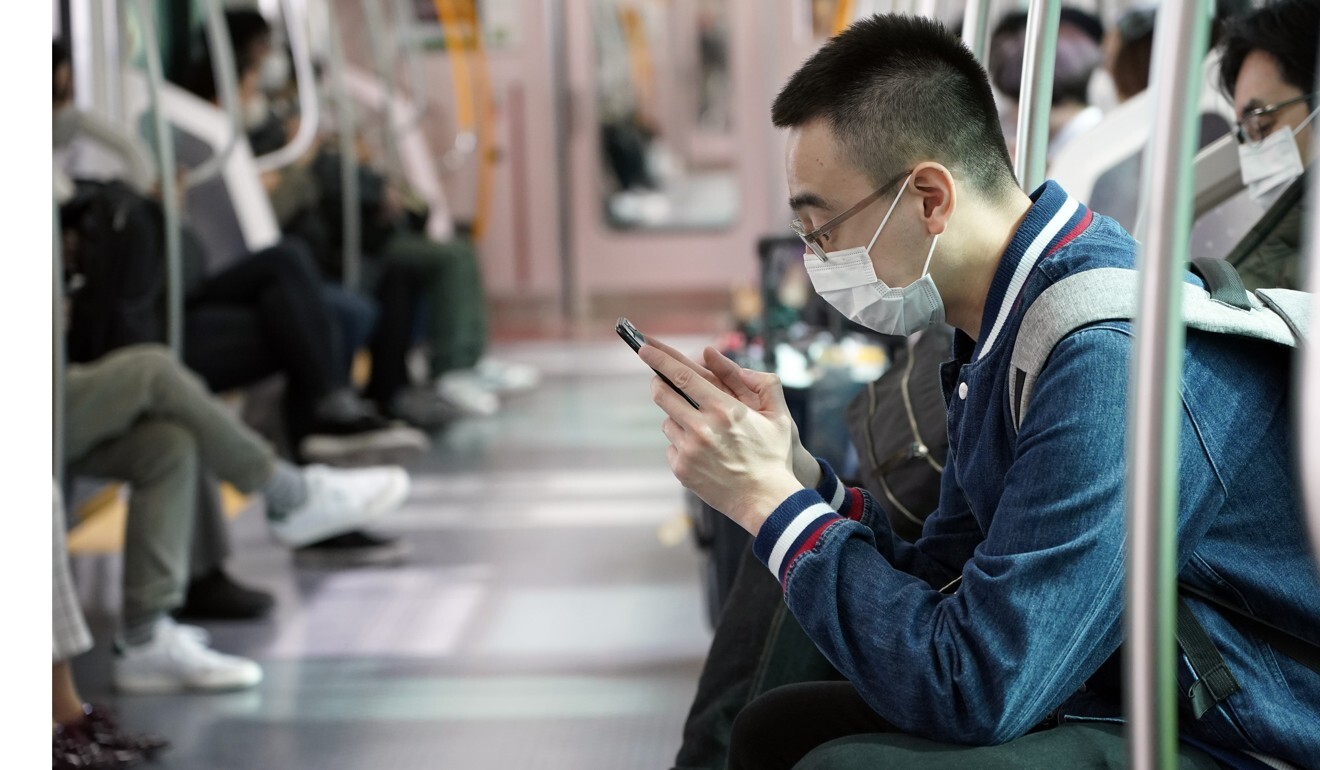
The law also gives local authorities the power to direct the sale of essential supplies, such as medicine and food, and to request or order emergency transport of specified goods.
Tokyo Governor Yuriko Koike said the city was in talks with the central government to decide what types of facilities it would ask to close or curtail business hours, while reiterating there would be no restrictions on buying groceries and medicine.
The measures come amid a spike in cases in Japan’s capital, which now has 1,033 confirmed infections, triggering concerns that the virus might be making inroads into the city and surrounding prefectures, which are home to 38 million people.
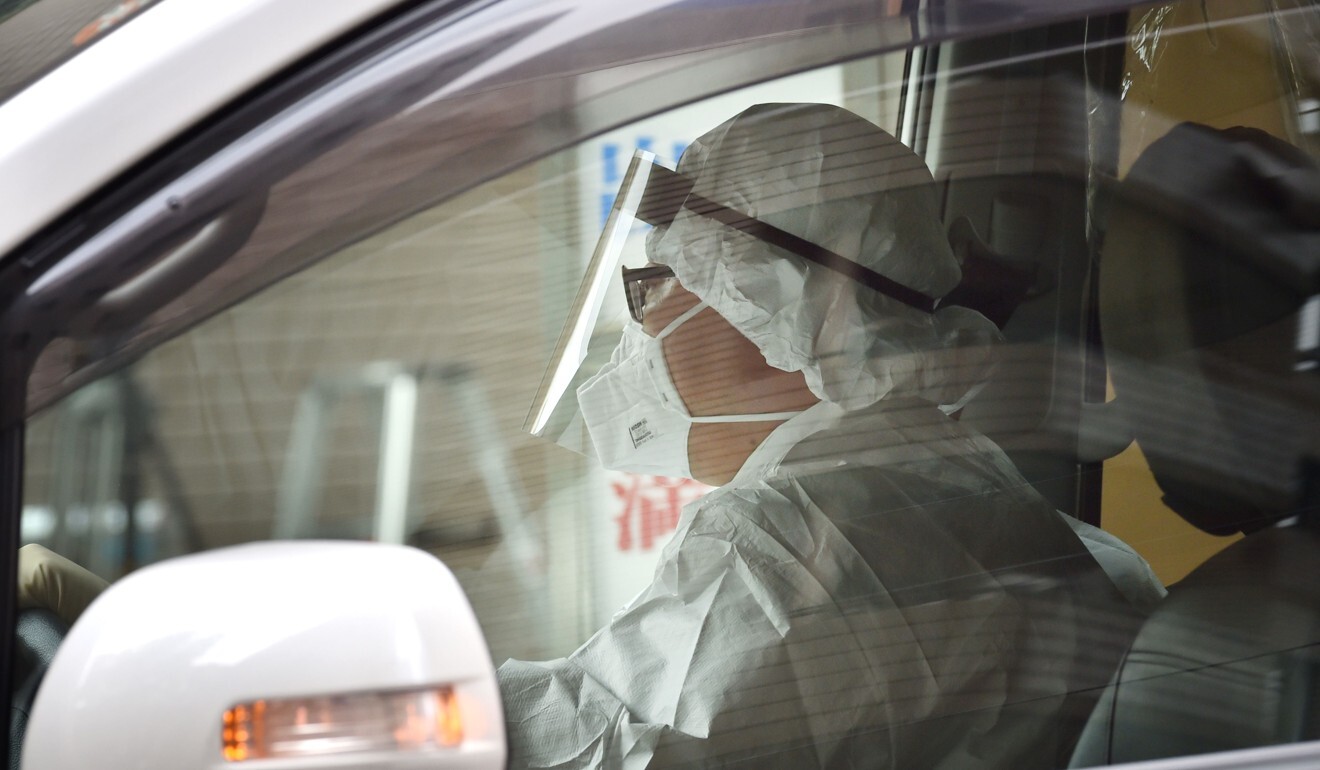
Eighteen trainee doctors at a Tokyo hospital who defied requests to not socialise in groups have tested positive for the coronavirus, after some of them attended a dinner party, Keio University Hospital has said.
The hospital’s head Yuko Kitagawa apologised in a statement and described it as an “intolerable act from people engaging in medical care who should protect patients”.
Keio University Hospital said one trainee doctor tested positive for Covid-19 last Tuesday (March 31) and subsequent tests found 17 more infections among 99 trainees who might have been in close contact with the first trainee. The infected 18 residents included those who did not attend the party, the hospital said, and all 99 had been ordered to self-isolate at home.
In contrast to the lockdowns in other countries where authorities can sanction those who do not follow orders, enforcement in Japan is expected to rely more on peer pressure.
“The Japanese state is powerfully embedded in society and has tremendous power to mould through moral persuasion that Western states do not have,” said Sophia University professor Koichi Nakano.
Abe’s move comes after calls by public health experts to impose stricter measures on the movement of people in the country of 127 million to limit the outbreak.
Japan has shied away from stronger enforcement steps in part because of memories of civil rights abuses during World War II. The protection of such rights is enshrined in the US-drafted post-war constitution.
“The [pre-war] Meiji Constitution had such powers and there were abuses,” said lawyer Koju Nagai. “The current constitution is based on the idea that human rights should be respected.”
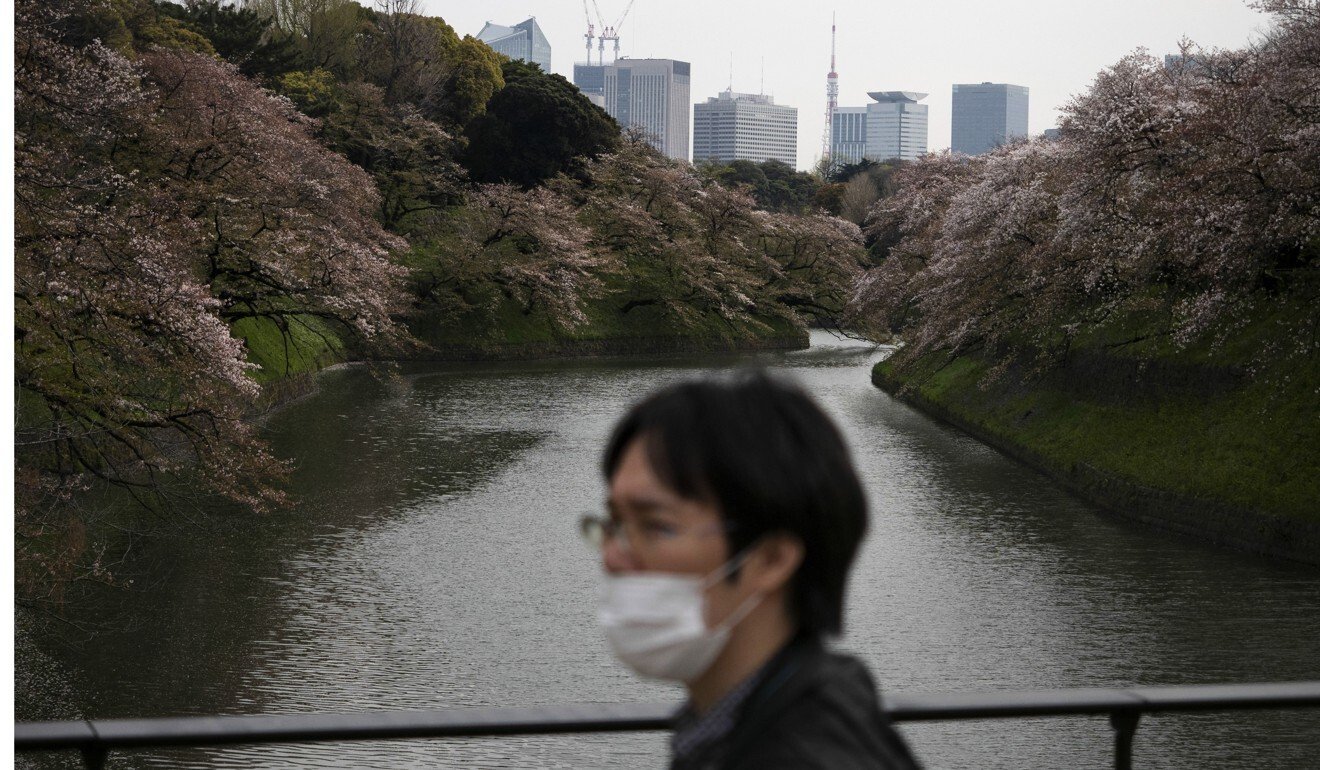
But given that the emergency measures will affect the seven prefectures that contribute about half of the country’s economy, there are deepening fears that output will plunge by as much as 20 per cent in the current quarter.
Tokyo and its three neighbours, Kanagawa, Chiba and Saitama, make up a third of the nation’s gross domestic product with output equivalent in size to Canada’s, and a heavy emphasis on services and retail.
Osaka is a popular tourist destination that is home to appliance and electronics makers Panasonic, Keyence, and Sharp. Add the Kobe region next to Osaka, and Fukuoka, a favourite shopping destination for visitors from China and South Korea, and the areas designated for the emergency make up about 48 per cent of GDP, according to a Bloomberg calculation based on Cabinet Office data.
Latest data showed that consumer spending in the world’s third-largest economy fell in February but at a slower-than-expected pace as households scrambled for protective masks, toilet paper and staple food. But spending on travel and entertainment slumped, government data showed on Tuesday, a sign households were cutting back on non-essential purchases even before travel bans and social distancing policies took effect in March.
Minister of Agriculture, Forestry and Fisheries Taku Eto called on shoppers to stay calm.
“We are asking citizens to buy only what they need when they need it as there is sufficient food supply and no suspension is planned at food factories,” he told reporters, adding there was no sign of disruption to Japan’s grain imports.
Many Japanese say the soft lockdown order will not affect them too much, as they had already assumed the rules were coming.
Mitsue Nagasaku, who lives in Yokohama and works for an electronics company, said she had kept her son away from school this week even though classes resumed on Monday after the spring holidays.
“He really wanted to go but I decided that any risk was just too much risk,” said the 42-year-old. “There are four of us in this house, my sister and her family live nearby and so does my elderly mother, so if one of us gets the coronavirus, then we might all get sick.”
Retired university professor Koichi Ishiyama, who lives in Tokyo, said he had been limiting his outings for some weeks now.
“I’ve just come back from the shops and I’m glad to be able to say that I saw no signs of people panic buying,” he said. “From now on, I intend to go for a brisk walk once a day, because they say it’s important that people still get exercise, and go shopping for food only when we need to.
“I’m 73 years old so I guess that puts me in a higher-risk category when it comes to this virus, so I’m doing what I can to stay safe and well,” he said.
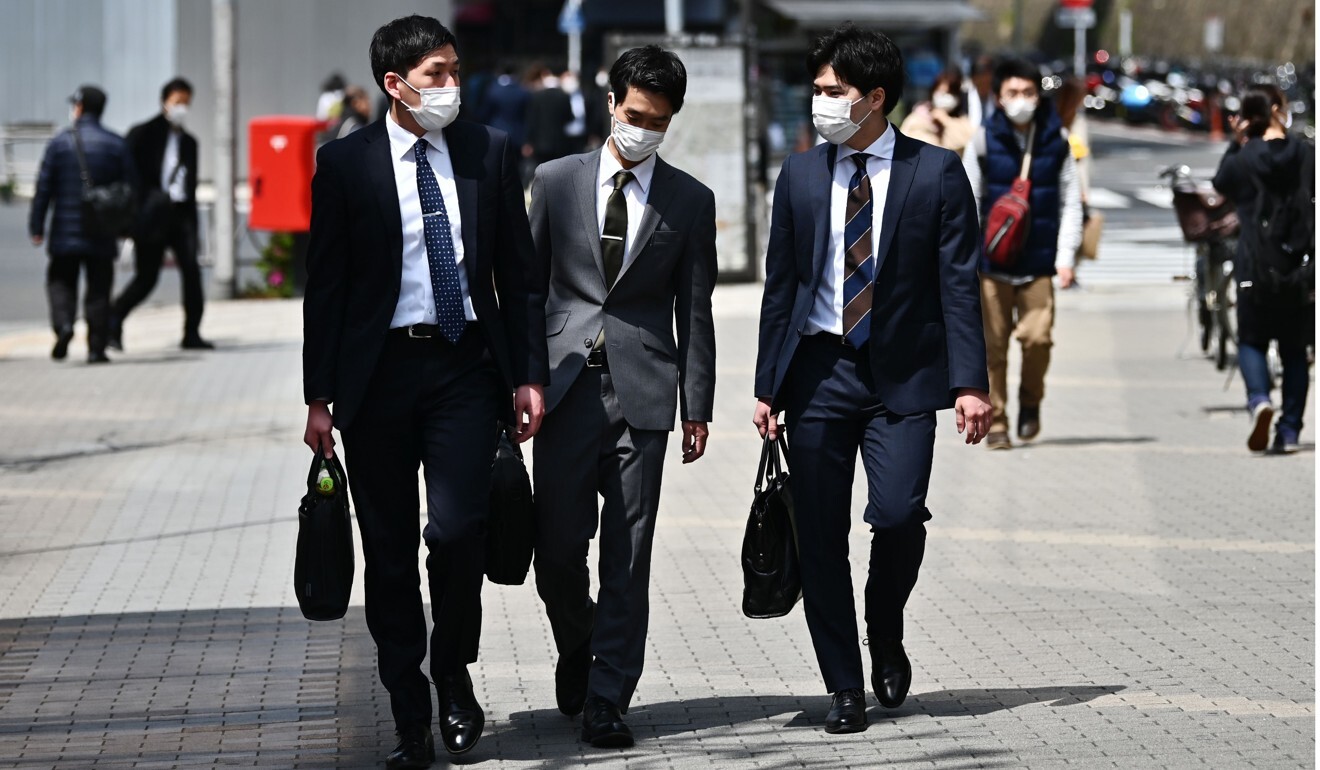
Taisuke Yokota, 33, has had to put one business venture on hold – he hopes to launch a new British brand of beer in Japan later in the year – but his other business has been doing very well out of the crisis, he said.
“We operate luxury camping holidays in Japan and we’re very busy at the moment because no-one can travel abroad, they still want a bit of a break and camping is safer because it is outdoors and distant from other people,” he said. “The only problem is that we have not been able to import more tents to keep up with demand.
“Personally, I’m not too worried about the virus but I do have to think about my friends and family – and particularly my grandparents,” he said.
Satoshi Ito, 51, who works for an international public relations agency in Tokyo, said the organisation was very proactive as soon as it became clear that the crisis was not going to blow over in a matter of weeks.
“We have all been working from home for several weeks now, so these new rules are not going to change much for us,” he said. “Obviously all the socialising has gone, but we are still talking to clients and I don’t actually see much impact at all.
“For me, I stopped going out a while back simply because I felt it was not safe,” he said. “You have to think about other people; the people you work with, your family, your friends.”
Additional reporting by Bloomberg